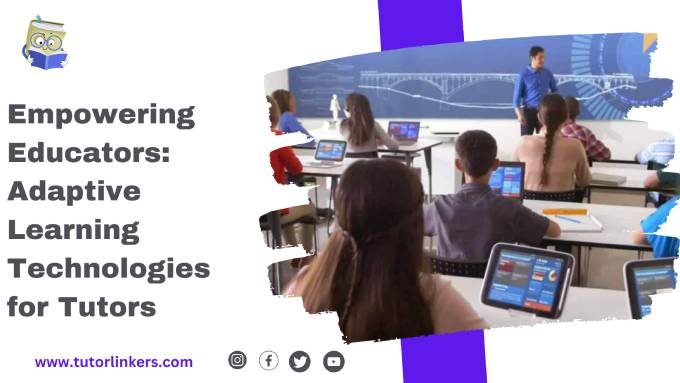Adaptive Learning Technologies for Tutors: In the realm of education, the integration of technology has revolutionized teaching and learning practices, offering innovative solutions to enhance student engagement, personalize instruction, and improve learning outcomes. Among these technological advancements, adaptive learning technologies have emerged as powerful tools for tutors, providing personalized learning experiences tailored to individual needs and preferences. In this blog, we’ll explore the impact of adaptive learning technologies on tutoring practices and how they empower educators to elevate their teaching effectiveness.
Understanding Adaptive Learning Technologies
Adaptive learning technologies encompass a range of educational software and platforms designed to dynamically adjust learning content, pace, and delivery based on individual learner needs. These systems leverage algorithms and data analytics to assess student proficiency, identify areas of strength and weakness, and deliver targeted interventions and remediation. Unlike traditional one-size-fits-all teaching methods, adaptive learning technologies offer personalized learning experiences that adapt in real-time to meet the unique needs of each learner, maximizing learning efficacy and engagement.
The Role of Adaptive Learning Technologies for Tutors
For tutors, adaptive learning technologies serve as invaluable tools for enhancing instructional effectiveness and supporting student success. By providing personalized learning experiences, targeted interventions, and data-driven insights, adaptive learning technologies enable tutors to tailor their instruction to individual student needs, optimize learning outcomes, and foster a culture of continuous improvement.
Benefits of Using Adaptive Learning Technologies for Tutors
- Increased Student Engagement and Motivation: Adaptive learning technologies engage students by delivering content that is relevant, interactive, and tailored to their learning preferences, fostering a sense of ownership and investment in their education.
- Improved Learning Outcomes: By targeting specific areas of weakness and providing customized remediation, adaptive learning technologies help students master concepts more effectively, resulting in improved retention and comprehension.
- Time Efficiency for Tutors: Adaptive learning technologies automate many aspects of the tutoring process, such as assessment, progress tracking, and content delivery, allowing tutors to focus their time and energy on providing targeted support and guidance to students.
Strategies for Integrating Adaptive Learning Technologies into Tutoring Practices
To effectively integrate adaptive learning technologies into tutoring practices, tutors can adopt the following strategies:
- Strategies for Integrating Adaptive Learning Technologies into Tutoring Practices
- Assessing Student Needs and Learning Styles:
- Before integrating adaptive learning technologies into tutoring practices, tutors should assess the individual needs and learning styles of their students. This involves understanding students’ strengths, weaknesses, preferences, and prior knowledge. Tutors can use various assessment tools, such as surveys, diagnostic tests, and interviews, to gather information about students’ learning needs and preferences. By identifying students’ individual learning styles and needs, tutors can better tailor their use of adaptive learning technologies to meet the diverse needs of their students.
- Selecting and Implementing Suitable Platforms:
- Once tutors have assessed students’ needs and learning styles, they can select and implement suitable adaptive learning platforms. Tutors should research different platforms and consider factors such as functionality, ease of use, compatibility with existing systems, and alignment with instructional goals. It’s essential to choose platforms that offer a wide range of adaptive features, including personalized content delivery, real-time feedback, progress tracking, and data analytics. Tutors should also ensure that selected platforms are user-friendly for both tutors and students, with intuitive interfaces and comprehensive support resources.
- Monitoring Progress and Adjusting Instruction Accordingly:
- As tutors integrate adaptive learning technologies into their tutoring practices, it’s crucial to monitor students’ progress and adjust instruction accordingly. Tutors should regularly track students’ performance, engagement, and learning outcomes using the data analytics and progress tracking features provided by adaptive learning platforms. Based on this data, tutors can identify areas where students are struggling, intervene with targeted support and remediation, and adjust instructional strategies to better meet students’ needs. By continually monitoring progress and adjusting instruction, tutors can ensure that students receive the support they need to succeed and maximize their learning outcomes.
- Assessing Student Needs and Learning Styles:
Case Studies: Real-Life Examples of Adaptive Learning in Tutoring
- John’s Progress: John, a struggling math student, benefited from adaptive learning technologies that provided personalized remediation and practice opportunities, resulting in significant improvements in his math skills.
- Sarah’s Success: Sarah, a student with learning challenges, received targeted interventions and support through adaptive learning technologies, enabling her to overcome obstacles and achieve academic success.
Overcoming Challenges and Misconceptions
While adaptive learning technologies offer numerous benefits, they are not without challenges and misconceptions. Tutors must address concerns about technology reliability, accessibility, and privacy, as well as invest in professional development and training to effectively integrate adaptive learning technologies into their tutoring practices.
Future Trends and Innovations in Adaptive Learning Technologies for Tutors
Looking ahead, the future of adaptive learning technologies holds promise and potential for further innovation and advancement. Integration of artificial intelligence, expansion of mobile and virtual reality applications, and development of collaborative learning environments are among the emerging trends that will continue to shape the landscape of tutoring practices.
Conclusion
In conclusion, adaptive learning technologies represent a transformative tool for tutors, offering personalized learning experiences, targeted interventions, and data-driven insights to optimize instructional effectiveness and support student success. By embracing adaptive learning technologies, tutors can elevate their teaching practices, empower their students, and cultivate a culture of lifelong learning and growth.
Read more: Fostering Independence Through Online Tutoring
FAQ’s
Ehsan Ali is a seasoned content writer and researcher with a talent for translating complex concepts into clear, engaging content. With a deep understanding of human behavior, societal trends, and technical topics, Ehsan creates insightful and impactful content that resonates with a broad audience. His expertise ensures that each piece is both accessible and compelling, bridging the gap between intricate details and everyday understanding.




